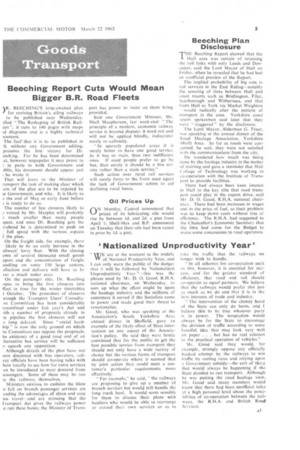'Nationalized Unproductivity Year'
Page 7

If you've noticed an error in this article please click here to report it so we can fix it.
WE are at the moment in the middle
YV of National Productivity Year, and I can only warn the public of the danger that it will be followed by Nationalized Unproductivity Year "—this was the phrase used by Mr. D. 0. Good, R.H.A. national chairman, on Wednesday, to sum up what the effect might be upon the haulage industry and the millions of customers it served if the Socialists came to power and made good their threat to renationalize.
Mr. Good, who was speaking at the Association's South Yorkshire Area annual dinner in Sheffield. gave an example of the likely effect of State intervention on one aspect of the Association's policy. He said they were firmly convinced that for the public to get the best possible service from transport they should not only have a wide variety of choice but the various forms of transport should co-operate where it seemed that by joint action they could meet a customer's particular requirements more effectively.
For example," he said, "the railways are proposing to give up a number of branch services but would still handle the long trunk haul.. It would seem sensible for them to discuss their plans with hauliers who would be able to rearrange or egtend their own services so as 10
take the traffic that the railways no longer wish to handle.
" In all schemes for co-operation such as this, however, it is essential for success. and for the greater standard of efficiency, that road and rail should co-operate as equal partners. We believe that the railways would prefer this just ' as much as we do and that it is in the best interests of trade and industry.
" The intervention of the clumsy hand of the State can only do harm, and I believe this to be true whatever party k in power. The temptation would always be for the State to encourage the division of traffic according to some fanciful idea that may look very well on paper . . but has no real relation to the practical operation of vehicles."
Mr. Good said they would, for example, strongly oppose any officially backed attempt by the railways to win traffic by cutting rates and relying upon a Government subsidy—the sort of thing that would always be happening if the State decided to run transport. Although he was putting the road haulage view, r. Good said many members would know that there had been unofficial talks at a high personal level about the possibilities of co-operation between the railways. the R.H.A. and British Road Services.




































































































